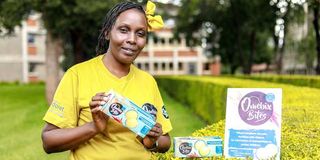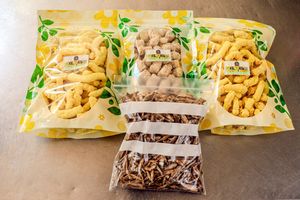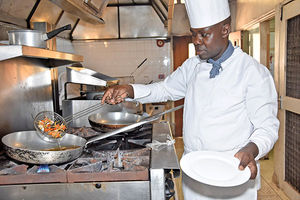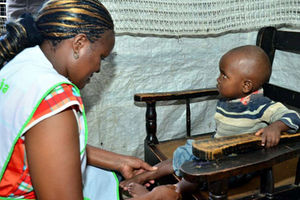
Esther Ateka displays Omebix biscuits, the product of her research project, at Baraton University.
In the bustling markets of Kenya, omena—a small, shimmering fish—is a familiar sight. Its silver scales glisten under the scorching sun, and while some savour the delicacy, others are put off by its smell and sometimes bitter taste. But in the heart of the Rift Valley, one woman sees it differently.
Esther Ateka, a lecturer at the University of Eastern Africa, Baraton, sees untapped potential and a hidden treasure that can change the course of the nation's future.
Esther's vision has become Omebix, a biscuit made from omena, designed to feed Kenya's malnourished children and offer a solution to a crisis that demands urgent attention.

Esther Ateka and her lab assistant David Kirwa place the dough into the oven to bake.
The statistics carry the weight of an unwelcome truth: the 2022 Global Nutrition Report reveals that 26.2 percent of Kenyan children under five are stunted, their growth and cognitive development stunted by malnutrition. In Kitui, the figure rises to a staggering 46 percent. Nationally, 4.2 percent of children suffer from wasting, and 11.5 percent of newborns are underweight, their first breaths already burdened by struggle. These are not just numbers; these are children whose futures are slipping away because of malnutrition, children whose potential is fading before it can even take root.
Esther refuses to accept this future for Kenya's children, and her determination gave birth to a snack made from this fish.
Rich in protein, omega-3 fatty acids, calcium, iron and essential vitamins, omena holds untapped promise. Its nutritional benefits could be the answer to a problem that has plagued the nation for years. But the challenge is to make it something children will eat. That's where Esther's relentless determination comes in.
“I had to make it work,” Esther says. From her small kitchen in Eldoret, she began experimenting tirelessly.
She dried the fish in the sun, soaked and rinsed it to remove the pungent odour, ground it into a fine flour and mixed it with wheat and sorghum to create a dough that's as nutritious as it is delicious. The result was Omebix – a biscuit that captures the full power of omena's nutrients, while offering a mild, savoury flavour that children can enjoy.
When Esther first shared Omebix with her students at Baraton, their reactions were filled with curiosity and surprise. “It’s… good,” one student said after tasting the biscuit, eyes wide with astonishment. “It’s different, but I’d never guess it has fish in it.” The subtle flavour of fish was present, but it didn’t overpower the other ingredients.

The raw omena and other refined ingredients, including wheat and sorghum flour, at Baraton University's nutrition lab.
For Esther, Omebix isn't just about making a snack, it's about saving lives. “Each percentage point in those statistics is a child,” she says, her voice laced with quiet urgency. “Each one is a future that malnutrition could steal.”
Her dream is simple but powerful: to see Omebix reach every home in Kenya, from the busiest cities to the most remote villages, giving children the nutrition they need to thrive.
But taking Omebix beyond her kitchen is no small feat. Esther faces the daunting task of securing production facilities, building a reliable supply chain and ensuring the biscuits are affordable. But perhaps the biggest hurdle is changing the perception of omena. Convincing people to embrace Omebix and the nutritional power of omena requires not only innovation, but also a change of mindset. But Esther is not daunted by the challenge.
“It’s not easy,” she admits, gazing outside her office in Baraton, where her journey began. “But if one child grows healthier because of this, then it’s already worth it.” Her resolve is unwavering.
In Esther’s hands, omena has been transformed into something full of promise. One biscuit, one child, one future at a time. In Omebix, Esther is baking not just a product, but a brighter, healthier future for Kenya.






